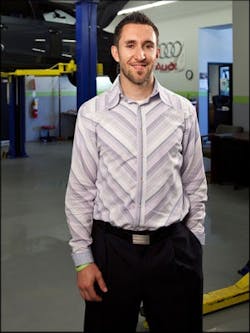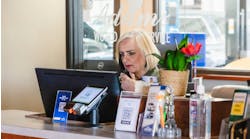Brian Sump doesn’t consider himself a car fanatic.
Don’t get him wrong: He loves cars, he really does. It’s just that he doesn’t spend his time watching auto races—or turning wrenches, for that matter. He’s never worked as a technician, and he’s the first to admit he doesn’t “know everything about every car” that comes into his shop.
Sump simply isn’t a typical shop owner.
Yet, some industry experts already see Sump, 31, as a future leader in the automotive repair industry and consider his shop—Avalon Motorsports, a German automotive specialty facility in Denver—to be one of the best, if not the best, shops in the entire country.
“Brian certainly isn’t like other shop owners; he’s very unique,” says Cecil Bullard, an automotive consultant and former owner of a number of successful repair facilities. “He’s really focused, really driven, and he isn’t afraid to look for help.
“This isn’t a guy who’s going to sit around his shop wondering how to be successful. He’s going to go find out, and he’s going to do it.”
Sump, a former pro wide receiver and kick returner who spent time with the San Diego Chargers and St. Louis Rams, bought Avalon in February 2007. It had revenues of just $8,000 in his first month at the helm, operating out of a grungy 10-foot-by-10-foot office attached to an independent service center. Five years and two locations later, the shop averaged more than $100,000 in sales per month, and Sump expects even larger numbers in 2012.
“We’ve been extremely blessed, and we continue to try to provide excellent service,” Sump says. “I’m a competitive person, a really competitive person. Everything I do, I want to be the best that I can. Our desire at Avalon is to be great and do whatever we can to be the best at what we do.”
Taking the Long Road
Sump’s first foray into cars was in high school when a friend of his bought a 1991 Volkswagen GTI.
“When I saw that car, I thought it was the coolest thing ever,” Sump says. “A few months later, I saved up money working and bought my own GTI like my friend’s. I put some lowering springs on it and some wheels and tires and a new exhaust. That was my first taste of owning a German vehicle and falling in love with performance upgrades.”
But that love affair would be put on hold for quite some time.
Sump had diverse interests as a kid. He played baseball growing up in Denver and made the high school all-state team—in band, playing the clarinet. He decided to go out for football his senior year, and after just a few months in the sport, he was offered a scholarship to play at the Colorado School of Mines.
Four years later, after two All-American seasons and earning a degree in civil engineering, Sump began a career as a professional athlete. After a two-year stint in the NFL, he played four seasons in the Arena Football League, winning an Arena Bowl championship in 2006 with the Chicago Rush.
In 2004, while playing for the AFL’s Los Angeles Avengers, Sump bought his first Audi. That off-season, he was looking for work back in Denver and stumbled upon Avalon Motorsports, which at the time was a performance parts distributor for German vehicles.
They had an opening.
“So I got hired on, just as an entry level position—sales and shipping and things like that for about seven months. Then I went back to play football in 2005,” Sump says. “I kept in touch with them the next few years until I retired from football in 2007.”
That’s when he bought the shop. After hearing it was struggling and the former owner was looking to either sell or close, Sump jumped at the chance. With a bit of savings and just a $15,000 small-business loan, Sump bought into his next career as an automotive service shop owner.
“I already had a chance to pursue my first dream job, which was to be a professional athlete,” Sump says. “So then I thought, ‘OK, what would be my second dream job?’ And that was working with cars. At the time, I thought it was about enhancing cars, but over time, I learned it was more just being around them.”
‘And Then … Boom!’
Sump admits that the first three years or so were a struggle. He had no true technical experience and, aside from his previous stint at Avalon, he had no business experience, either.
He turned Avalon into a service shop after just six months, moving across town to a different location with its own storefront. The new space was just 2,600 square feet, and Sump had only one additional staff member, technician Phil Carpenter.
Sump knew he wanted his shop to stand out, and the plan was to do that with expert mechanical service (Carpenter specialized in Audis and Volkswagens) and building strong relationships with customers.
“I always thought if I got people in the door, I knew that I could make them happy, I knew the level of service I could provide would be astounding,” Sump says. “My thought was that if I could do that and deal with my clients, then I could hire experts to work on the cars. Any question I had or that may arise, I could refer to my technicians and get the answers to the clients.”
And that worked—for the most part. Sump and Carpenter had a regular stream of customers, but a couple of years in, Avalon still wasn’t making much money. It wasn’t until the business moved to its current location in 2011 that it really took off.
“I felt like we always had a steady stream of customers and that we were doing fine,” says Carpenter, now Avalon’s service manager. “Our location held us back, though. We had this awesome reputation and this tiny facility that people couldn’t find, even if you gave them directions.
“It was just building and building and building,” Sump says. “And then we get to this new facility and then … boom! As soon as we got to this new building, it kind of exploded.”
After moving into a state-of-the-art, 6,000-square-foot facility in a wealthier, more established area of Denver, Avalon’s monthly revenue doubled, says Bullard, who provides his consulting services to the shop. Even with the costs of creating a new, bigger facility and adding staff, Bullard says Sump made a significant profit last year, over the six-figure mark. “A very impressive year,” Bullard says.
Crafting a Culture
Sump says he uses just one word to sum up the strength of his shop today: culture. “We know our identity, and we know what makes us distinct from every other shop,” he says.
That wasn’t always the case, and it took Sump nearly three years to figure it out.
The problem, as he puts it, was that he wanted to be a high-end shop, but the business model didn’t support that. Despite having an expert technician, who specialized in a specific brand of vehicle (focusing mostly on Audi and Volkswagen repair work), Sump says his prices didn’t reflect that.
“We thought the way to make the model work was to be the cheapest in town,” Sump says. “While that probably did help to capture some of the market share, or it may have, that isn’t a model, at least for us, that was going to be successful and be around for a long time.”
So, Avalon made a switch. Rather than trying to get people through the doors with discounts and promotions, Sump shifted his approach to providing customers with “premier” service, service worth higher prices.
“Really, our focus became on things that add value to our customers,” Sump says.
This included warranties that were three times that of the local dealer shops, not to mention free rental vehicles and free car washes. Sump hired two more technicians—one an expert on Porsche vehicles, the other on BMWs and MINIs—and two more members of his service staff. And customer service became the overriding focus.
The idea was to build a culture, Sump says, something that customers felt when they walked in the door but couldn’t quite put their finger on.
“It’s a very hard word to describe,” Sump says. “What do the customers feel when they walk in? What does it look like? How does it smell? How were they greeted? Were they educated? If a technician walks by, did they smile? Those are all things that create a culture. It’s something that most people, most clients might not consciously think about. It’s just a feeling, and you have to create a culture in your shop that lets people know this is the real deal.”
All of it was a big risk for Sump. Overhauling pricing could have turned off customers. Hiring more employees, moving to a newer, larger facility—it all costs a great deal of money.
For Sump, though, it was a calculated risk. He had the confidence in his staff and in himself to take that chance.
“You have to take a risk if you want to grow,” Sump says. “The foundation of that risk is your vision for your business, what you want your business to be. If you’re stuck in your little shop and you don’t have the desire to grow, you don’t have a desire to push the envelope and do better and to, frankly, be the best at what you do, that‘s going to reflect in your sales and your profits and your overall reputation.”
Hitting His Stride
Stepping into the lobby of Avalon Motorsports today, it’s easy to understand what Sump envisioned for the shop’s culture. Everything is sleek and modern, and employees are friendly and helpful. Everything feels high-end, from the leather sofas and flat-screen TV in the waiting room to the parts installed on the vehicles.
“Brian’s the type of guy that he’s always looking for new ways to improve, whether that’s himself or the shop,” Carpenter says. “He just has unlimited amounts of drive. He’s never sitting back, never riding the wave.”
And that’s what Sump hopes other shop owners can understand: You don’t need to drive up prices or cater toward high-end clientele to improve your shop, he says, you simply need to focus on what makes your shop unique, and continually work to improve it.
“It’s about having a level of humility in knowing that I don’t have all the answers,” Sump says, “I can always improve, and I can always do better and do more. Training and education are a huge part of that.”
Bullard calls the culture in the shop “remarkable” and says that Sump’s unique perspective as a non-technician shop owner has proved to be valuable.
And while Bullard (and Sump, too) feels the shop has plenty of room for growth, he says it’s already one of the best-run service centers he knows and that Sump has a very bright future.
“Brian’s attitude and thirst for knowledge put him in a very good place to being an industry leader,” Bullard says. “He’s not there yet, but I can see it. In three or four years, I can see him being the person people come to his shop to see what his shop was run like so they could model themselves off him.”
Sump isn’t worried much about all of that. Now that the shop has a model that should continue to guide the company successfully, he can focus on what he feels is his real strength, dealing with customers.
“I do love cars, and I think it’s a great way to make a living for yourself,” he says, “but I’ve always excelled in relationships with people, and I’m still learning a lot about cars as I go. “



